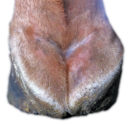Advertise Follow Us
Articles Tagged with ''Veterinarian''
Web-Exclusive Feature
Hoof Beats: The Language Of Conformation
Understanding some anatomy terms will make for better conversations with veterinarians
Read More
Contracted Heels Usually Mask Underlying Problems
Understanding the cause can lead to solutions for the horse
Read More








